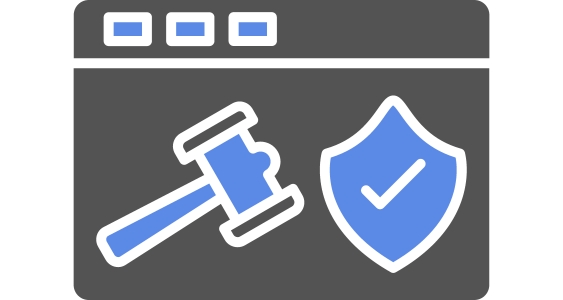As technology advances, including the widespread adoption of artificial intelligence (AI), the ability to collect and analyze massive amounts of information poses a unique challenge when safeguarding user privacy. In response, lawmakers across the globe, recognizing the implications of AI on privacy, have attempted to pass legislation, including AI privacy laws, that govern how data is collected and used by AI.
Any Chief Privacy Officer examines how these laws are developing to protect citizens’ privacy while allowing companies to take advantage of new technologies. Rosenthal will also discuss some of the world’s leading attempts at a regulatory framework to ensure ethical AI development, including the General Data Protection Regulation (GDPR) and California Consumer Privacy Act (CCPA).
Additionally, this article will examine what steps organizations can take to remain compliant with current regulations and prepare for future legislation involving AI use.
An Overview Of Privacy Legislation And Its Role In AI Regulation

Privacy legislation is integral in regulating artificial intelligence (AI) technology. As AI transforms how we live and work, concerns over protecting personal data have become increasingly prevalent. The implementation of privacy legislation helps ensure that individuals have control over their data and that it is being used ethically.
By establishing clear guidelines for collecting and using personal data in the development of AI, privacy legislation acts as a safeguard against potential abuses of technology. For AI to fully realize its potential in improving our lives, it must operate within a system of regulation that prioritizes protecting personal information. So, it’s important to understand the role of privacy legislation in AI regulation.
The Benefits Of Privacy Laws For Consumers
Privacy concerns continue to grow as technology advances and consumers become more reliant on digital services. Fortunately, laws can protect consumers from having their personal information exploited. Noga Rosenthal explains that privacy laws protect consumers from businesses that may use or sell their information without their consent. Such laws also enhance the accountability of companies and ensure that they take necessary measures to safeguard sensitive data.
Privacy laws establish trust between businesses and customers by giving consumers the right to control their information. Ultimately, the benefits of privacy laws for consumers are immense since they provide peace of mind, foster ethical business practices, and safeguard data from exploitation.
What Does Privacy Legislation Cover When It Comes To AI Technology And Data Collection Practices
As AI technology advances, so does the amount of data being collected. With this comes privacy concerns over how the information is being used. Fortunately, legislation has been put in place to combat these issues. Privacy legislation generally covers how data is collected, stored, and used. This means that when it comes to AI technology and data collection practices, there are rules that must be followed.
Appropriate measures must be taken to ensure that personal information is secure and used only for its intended purpose. As we move forward in the age of AI, these privacy regulations will be increasingly important in protecting our rights as individuals.
Different Types Of Privacy Laws Around The World And How They Affect AI Usage

Privacy concerns are becoming increasingly complex as technology advances and becomes more sophisticated. There are numerous privacy laws globally, each with specific regulations and requirements. These different privacy laws can drastically affect the use of artificial intelligence (AI) in various industries. Noga Rosenthal suggests that companies must be diligent in understanding the privacy laws of the countries in which they operate.
Failure to comply results in severe consequences, including legal action and fines. Despite the potential challenges, incorporating AI into various fields has significantly improved efficiency and accuracy. Adapting to the diverse privacy laws worldwide will best harness the full potential of this rapidly evolving technology.
Challenges Faced By Companies When Implementing Privacy Regulations Related To AI Development
As technology advances, so do concerns about data privacy. This is especially true when it comes to AI development. Companies face numerous challenges when implementing privacy regulations related to AI. For starters, current regulations may not be equipped to handle the complexities of AI. Additionally, ensuring that personal data is protected while allowing for effective AI development can be a difficult balancing act. Companies must also consider the potential biases and discrimination that can arise from AI algorithms. Overcoming these challenges will ensure that AI development is both responsible and effective.
How Companies Can Take Advantage Of Existing Privacy Legislation To Ensure Compliance With AI Regulations
As companies invest in artificial intelligence (AI) technology, they must be mindful of privacy legislation governing personal data collection, storage, and use. Failure to comply results in legal and financial consequences. Fortunately, companies can use existing privacy legislation to ensure compliance with AI regulations. This involves carefully reviewing the laws and regulations governing data protection, cybersecurity, and privacy.
It also requires a comprehensive data protection program that includes encryption, access controls, and audit trails. By proactively addressing these issues, companies can avoid costly penalties and develop AI applications with the utmost confidence in their compliance.
Final Thoughts
This blog post has presented a comprehensive overview of privacy legislation, its role in AI regulation, and potential consumer benefits. It also explored privacy laws about the development and use of AI technologies, different types of privacy legislation worldwide, and the challenges companies face when developing or implementing AI related to data collection practices. Additionally, it discussed how companies can use existing privacy legislation to ensure compliance with AI regulations. Overarching themes were highlighted: user benefits, government-driven regulations, and business implications.
In light of these developments, individuals, businesses, and governments need to stay updated on legislative developments to stay ahead of any potential compliance challenges. Furthermore, businesses should note emerging trends concerning privacy legislation and laws surrounding AI usage to maximize opportunities available while managing risks at every stage of their operations. Taking advantage of this legislation could ensure organizations remain compliant with current regulations while safeguarding user data rights in the long run.










